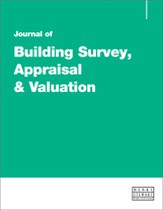Surveying modern façades and common defects
Abstract
The modern façade has evolved dramatically in the last century, from the time of the very first curtain wall system, through the watershed change from steel to aluminium in modern façade framing systems, to the modern methods of building contemporary façades. Changes in architectural trends, as well as new technologies employing innovative uses for materials, have led to increasingly complex façade designs. The specialist knowledge required to deal with modern façades has created a new construction expert, the Façade Engineer, which now is part of an established profession with an increasing number of specialists. However, professionals who value and survey buildings also need to be aware of modern methods of construction in the façade industry. The various types of modern façade systems have paved the way for today’s architectural environment. With it come manifold advantages and improved comfort for building users. Furthermore, there is an increased rate of merging traditional construction, especially heritage, with elements of modern façades. Such projects raise specific challenges for all construction professionals and a particular set of knowledge and experience is required to deal with them. The ability to differentiate between traditional and modern construction methods is key to surveying and valuing buildings. The increased complexity of modern façades generally means that specialist input from a Façade Engineer is required for the assessment and investigation of the more complex façade systems. This paper presents the main façade systems using modern methods of construction, their characteristics and common defects. For the purpose of valuation and general surveying of modern façades, the classifications and descriptions of façade systems presented in this paper together with common defects should provide a good starting point.
The full article is available to subscribers to the journal.
Author's Biography
Tudor Pop is a Director in the Façade Consultancy department at CBRE, the largest commercial real estate services and investment firm in the world. He holds postgraduate qualifications in Façade Engineering and Sustainable Heritage, having been involved in projects dealing with both modern and traditional construction façades. His experience includes working with a large variety of façades and building envelope systems, from 1950s buildings to contemporary new-build, in both the UK and Europe. Tudor has experience with most modern materials used in various façade and roof systems. He is particularly interested in modern heritage and listed modern buildings, where his knowledge and experience combines the two specialist fields.
Citation
Pop, Tudor (2018, June 1). Surveying modern façades and common defects. In the Journal of Building Survey, Appraisal & Valuation, Volume 7, Issue 1. https://doi.org/10.69554/SIPJ4384.Publications LLP
